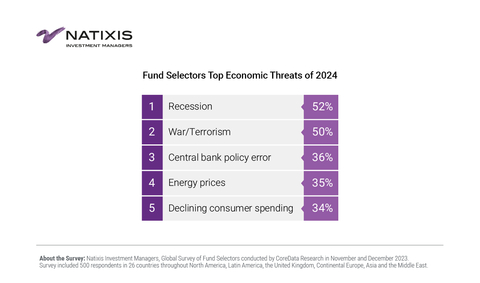- 69% of professional fund selectors think active fund management is necessary to achieve alpha this year. Many are beefing up active strategies by adding more active ETFs and direct indexing options.
- 74% have found that model portfolios make clients more confident and more likely to stay invested (69%) when markets swing. Wealth managers are looking to third-party asset managers to enhance their model portfolio offering.
- Product and portfolio adjustments reflect an uncertain market and economic environment with forecasts for slower growth, increased volatility, and higher-for-longer rates and inflation.
Nearly seven out of ten (69%) professional fund selectors from some of the largest US wealth management firms agree that active fund management will be essential to investment outperformance in 2024, according to new survey findings released today by Natixis Investment Managers (Natixis IM). This comes after 58% report that the actively managed funds on their platforms outperformed their benchmarks last year, and 65% expect the markets to continue favoring active management.
This press release features multimedia. View the full release here: https://www.businesswire.com/news/home/20240206124596/en/

Natixis Investment Managers: Fund Selectors Top Economic Threats of 2024 (Graphic: Business Wire)
Wealth managers have been working to get the right balance between active and passive investments over the past decade, which saw massive inflows to passively managed index funds across the industry. Yet 45% of fund selectors surveyed by Natixis IM attribute the outperformance of passive investments to Federal Reserve policy, or ten years of artificially low interest rates and relatively no inflation. Now, the market factors that elevated passive investing may no longer hold up. Nearly half (49%) of fund selectors think that investors who are relying too much on passive investments like index funds will have some hard lessons to learn in 2024.
Natixis IM surveyed 198 US fund selectors, the investment professionals responsible for vetting and selecting the funds and other investment products on their firm’s investment platform. Respondents represent private banks, wirehouses, registered investment advisors (RIAs) and RIA aggregators, independent or individual wealth managers, and other investment advisory firms that collectively manage $19.4 trillion in client assets.
“Fund selectors expect the 2024 investment landscape to be anything but normal, not by historical, new- or next-normal standards,” said Dave Goodsell, head of the Natixis Center for Investor Insights. “They are looking to manage client investments, the client experience, and relationships by adjusting their firms’ product and model portfolio offering to help clients stay invested and armed with protection in unfamiliar investing territory.”
The survey found:
- 43% of fund selectors are looking to add more active strategies to their platforms.
- 72% say their firms now offer semi-transparent exchange-traded funds (ETFs), and 90% of those plan to either maintain (73%) or add more (16%) of these actively managed ETFs.
- 71% offer direct indexing options. Of those, 84% plan to maintain (53%) or increase (31%) access to direct index strategies, which through a separately managed account allow investment managers to establish direct ownership of individual stocks that make up an index.
Assets into active ETFs have soared in recent years.1 They differ from traditional, passively managed ETFs in that instead of replicating an index, there is a management team behind the portfolio selecting securities based on a specified underlying investment strategy. The use of active ETFs is helping firms address price concerns, which has been a promise of passive investing, and the need to generate risk-adjusted returns, which passive funds don’t inherently provide.
While 50% of fund selectors say the prime benefit of active ETFs is cost efficiency, even more (52%) say the biggest benefit is tax efficiency. Other benefits of the structure include the convenience of accessing innovative strategies (45%), intraday trading (41%), and enhanced alpha potential (25%).
Model portfolios help keep clients invested and provide a more consistent client experience
Model portfolios and separately managed accounts are two other structures front and center in fund selectors’ product plans for 2024. Nearly three-quarters (74%) have found that model portfolios give investors greater confidence in uncertain markets, help keep clients invested during periods of volatility (69%), and provide a more consistent investment experience for clients across the firm (78%). Not surprisingly, 61% say the use of models also helps advisors build strong relationships with their clients.
The survey found:
- 84% of fund selectors say their firm has some form of model offering. While most (65%) are proprietary models developed by in-house investment teams, 41% of fund selectors say they are adding more third-party models to their platform in 2024.
- 41% say their firm has a greater need for specialty models to complement core portfolios. The three strategies they are looking to add are high-net-worth models with advanced customization capabilities (49%), tax-managed (42%) and thematic models focused on market trends such as longevity, climate change, and disruptive technologies (36%)
- 77% currently offer clients access to separately managed accounts (SMA), and 35% of those intend to expand their SMA offering over the next two years
Uncertain market and economic outlook
Most (57%) are optimistic about this year’s market performance. Their outlook, however, is muted by a high degree of uncertainty and unpredictable risk. The specter of slower growth ahead, puts recession at the top of economic threats (54%), followed by the threat of war and terrorism (50%), and a dreaded decline in consumer spending (42%). Most fund selectors (68%) think valuations still don’t reflect company fundamentals, and 59% expect stock market volatility to be even greater this year than last. Should recession fears be realized, 61% think it would further reveal the inadequacies of passive investments.
The survey found:
- 65% of fund selectors are bullish on bonds this year. In keeping with an outlook in which 58% are forecasting rate cuts, 66% project long-duration bond portfolios to outperform short-duration. Some may be waiting to make their move in time with rate cuts as 49% believe rates will remain elevated throughout 2024. Most (74%) don’t think a 2% inflation target will be achieved in 2024, and 72% agree that the timing of rate cuts will be critical to ensuring that inflation does not reignite. In the meantime, 61% are using short-term bond ETFs to counter duration risk.
- 56% are bullish on stocks, but they are split 50-50 on whether US markets or international markets will outperform. Just over half (54%) expect large caps to carry them through what appears to be a rough year.
- Private assets continue to be the headline on allocation plans for alternative investments in 2024 as fund selectors remain bullish on private debt (56%) and to a lesser extent private equity (49%). Of those who invest in them, 42% plan to add to their private equity offerings, and 41% will increase their private debt offerings over the next two years.
The survey of US fund selectors is part of a larger survey of 500 professional fund selectors across Asia, Europe/EMEA, North America and the UK. A full copy of the report on the global findings from the 2024 Natixis Investment Managers Pro Fund Selector Survey can be found at: https://www.im.natixis.com/us/research/2024-fund-selector-outlook
Methodology
Natixis Investment Managers’s Global Survey of Fund Selectors was conducted by CoreData Research and completed in December 2023. The global survey included 500 respondents throughout North America, Latin America, the United Kingdom, Continental Europe, Asia, and the Middle East and who collectively are responsible for $34.8 trillion in client assets under management.
About the Natixis Center for Investor Insight
The Natixis Center for Investor Insight is a global research initiative focused on the critical issues shaping today’s investment landscape. The Center examines sentiment and behavior, market outlooks and trends, and risk perceptions of institutional investors, financial professionals and individuals around the world. Our goal is to fuel a more substantive discussion of issues with a 360° view of markets and insightful analysis of investment trends.
About Natixis Investment Managers
Natixis Investment Managers’ multi-affiliate approach connects clients to the independent thinking and focused expertise of more than 15 active managers. Ranked among the world’s largest asset managers1 with more than $1.1 trillion assets under management2 (€1.1 trillion), Natixis Investment Managers delivers a diverse range of solutions across asset classes, styles, and vehicles, including innovative environmental, social, and governance (ESG) strategies and products dedicated to advancing sustainable finance. The firm partners with clients in order to understand their unique needs and provide insights and investment solutions tailored to their long-term goals.
Headquartered in Paris and Boston, Natixis Investment Managers is part of the Global Financial Services division of Groupe BPCE, the second-largest banking group in France through the Banque Populaire and Caisse d’Epargne retail networks. Natixis Investment Managers’ affiliated investment management firms include AEW; DNCA Investments;3 Dorval Asset Management; Flexstone Partners; Gateway Investment Advisers; Harris Associates; Investors Mutual Limited; Loomis, Sayles & Company; Mirova; MV Credit; Naxicap Partners; Ossiam; Ostrum Asset Management; Seventure Partners; Thematics Asset Management; Vauban Infrastructure Partners; Vaughan Nelson Investment Management; and WCM Investment Management. Additionally, investment solutions are offered through Natixis Investment Managers Solutions and Natixis Advisors, LLC. Not all offerings are available in all jurisdictions. For additional information, please visit Natixis Investment Managers’ website at im.natixis.com | LinkedIn: linkedin.com/company/natixis-investment-managers.
Natixis Investment Managers’ distribution and service groups include Natixis Distribution, LLC, a limited purpose broker-dealer and the distributor of various US registered investment companies for which advisory services are provided by affiliated firms of Natixis Investment Managers, Natixis Investment Managers S.A. (Luxembourg), Natixis Investment Managers International (France), and their affiliated distribution and service entities in Europe and Asia.
1 Cerulli Quantitative Update: Global Markets 2023 ranked Natixis Investment Managers as the 17th largest asset manager in the world based on assets under management as of December 31, 2022.
2 Assets under management (“AUM”) of current affiliated entities measured as of September 30, 2023 are $1,179.7 billion (€1,114.3 billion). AUM, as reported, may include notional assets, assets serviced, gross assets, assets of minority-owned affiliated entities and other types of non-regulatory AUM managed or serviced by firms affiliated with Natixis Investment Managers.
3 A brand of DNCA Finance.
All investing involves risk, including the risk of loss. Investment risk exists with equity, fixed-income, and alternative investments. There is no assurance that any investment will meet its performance objectives or that losses will be avoided.
The views and opinions expressed may change based on market and other conditions. This material is provided for informational purposes only and should not be construed as investment advice. There can be no assurance that developments will transpire as forecasted. Actual results may vary.
The data shown represents the opinion of those surveyed, and may change based on market and other conditions. It should not be construed as investment advice.
An index fund is a type of mutual fund with a portfolio constructed to match or track the components of a financial market index.
Unlike passive investments, there are no indexes that an active investment attempts to track or replicate. Thus, the ability of an active investment to achieve its objectives will depend on the effectiveness of the investment manager.
Alternative investments involve unique risks that may be different from those associated with traditional investments, including illiquidity and the potential for amplified losses or gains. Investors should fully understand the risks associated with any investment prior to investing.
Semi-transparent ETFs differ from fully-transparent ETFs. Semi-transparent ETFs are only required to show their full portfolio holdings on a monthly or quarterly basis, as opposed to fully transparent ETFs, which are required to show their full portfolio holdings daily.
Unless otherwise stated, data is derived from Natixis Investment Managers, Global Survey of Fund Selectors conducted by CoreData Research in November and December 2023.
6304598.1.1
1 Morningstar Direct, as cited in Nov. 13 2023 Morningstar article “Here’s Why Active ETFS Are So Hot Right Now https://www.morningstar.com/etfs/constellation-factors-powering-active-etfs-meteoric-rise
View source version on businesswire.com: https://www.businesswire.com/news/home/20240206124596/en/
Contacts
Kelly Cameron
+ 1 617-449-2543
Kelly.Cameron@natixis.com





